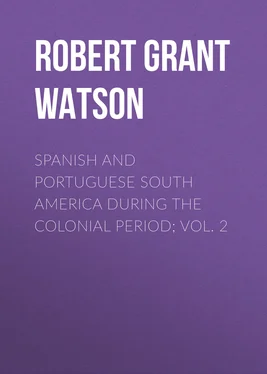Robert Grant Watson - Spanish and Portuguese South America during the Colonial Period; Vol. 2
Здесь есть возможность читать онлайн «Robert Grant Watson - Spanish and Portuguese South America during the Colonial Period; Vol. 2» — ознакомительный отрывок электронной книги совершенно бесплатно, а после прочтения отрывка купить полную версию. В некоторых случаях можно слушать аудио, скачать через торрент в формате fb2 и присутствует краткое содержание. Жанр: foreign_prose, История, foreign_edu, foreign_antique, на английском языке. Описание произведения, (предисловие) а так же отзывы посетителей доступны на портале библиотеки ЛибКат.
- Название:Spanish and Portuguese South America during the Colonial Period; Vol. 2
- Автор:
- Жанр:
- Год:неизвестен
- ISBN:нет данных
- Рейтинг книги:3 / 5. Голосов: 1
-
Избранное:Добавить в избранное
- Отзывы:
-
Ваша оценка:
- 60
- 1
- 2
- 3
- 4
- 5
Spanish and Portuguese South America during the Colonial Period; Vol. 2: краткое содержание, описание и аннотация
Предлагаем к чтению аннотацию, описание, краткое содержание или предисловие (зависит от того, что написал сам автор книги «Spanish and Portuguese South America during the Colonial Period; Vol. 2»). Если вы не нашли необходимую информацию о книге — напишите в комментариях, мы постараемся отыскать её.
Spanish and Portuguese South America during the Colonial Period; Vol. 2 — читать онлайн ознакомительный отрывок
Ниже представлен текст книги, разбитый по страницам. Система сохранения места последней прочитанной страницы, позволяет с удобством читать онлайн бесплатно книгу «Spanish and Portuguese South America during the Colonial Period; Vol. 2», без необходимости каждый раз заново искать на чём Вы остановились. Поставьте закладку, и сможете в любой момент перейти на страницу, на которой закончили чтение.
Интервал:
Закладка:
Before commencing the passage of the Tapicura , Haus directed a heavy fire into the wood on the further side, and then immediately advanced under cover of the smoke. As was foreseen, the Dutch were led on, step by step, into the cane-wood. They were received at the first ambush with a discharge, every shot of which took effect. They pushed on to the second; but at the third their loss was so great that they were compelled to fall back. They were not, however, disheartened, and, having reformed into three bodies, they again advanced through the canes. They were visibly gaining ground, when, in a panic caused by the fear of another ambuscade, they were a second time repulsed.
The engagement now lasted for several hours; but the Dutch had not yet brought their entire force into action. After a short breathing-time they returned with fresh troops to the attack. It was now that the exhausted Portuguese were indebted to the priests amongst them for enthusiasm which supplied the place of strength. They were exhorted not to give way to heretics; and many were the vows offered to Christ and the Virgin by those who besought their help in this their hour of need. Fernandes in particular promised a church to the latter; whilst he appealed to his slaves to distinguish themselves, by the promise of immediate freedom. His guard rushed down the hill, blowing their horns, and charged the heretics with such spirit that the latter were driven back through the canes. Haus made one more attack; but this, too, was in vain, and the Portuguese remained masters of the field.
1645.
The fight had lasted the entire day [August 3rd]. On the stormy night which followed, the Dutch, under cover of darkness, recrossed the Tapicura . The Portuguese passed the night in preparations for a renewal of the attack on the morrow; but daylight showed them the extent of their victory. A messenger arrived from Haus, requesting quarter for the wounded, when Fernandes, according to his promise, immediately emancipated fifty slaves. Three hundred and seventy Dutch were found dead upon the field; whilst about four hundred wounded had been carried away. Of the Portuguese the loss is said to have been under forty, not, however, including the negroes or natives. So important a success, and one obtained at so small a cost, was, of course, ascribed to supernatural assistance; many persons affirmed, and perhaps believed, that in the hottest hour of the battle a woman and a venerable man were seen amongst the combatants distributing powder and bullets, and dazzling the eyes of the heretics. These were the Mother of Mercies, whom they had invoked, and the good St. Anthony, the hermit, the favourite protector of the Portuguese.
CHAPTER IV.
BRAZIL; CONCLUSION OF THE DUTCH WAR
Haus, with the wreck of his army, continued his retreat throughout the night, never halting until seven leagues’ distance lay between him and the scene of his defeat. He then awaited his wounded and stragglers, whilst he sent to Recife for immediate assistance. Succours reached him the same day, sufficient to secure his further retreat, but not to enable him to resume offensive operations. The Council now distinctly perceived their danger; and they had reasons to distrust the professions of the governor of Bahia . Three weeks before the battle Hogstraten and another deputy had been sent to Bahia to express the belief of the Dutch Government that Camaram and Diaz were not authorized in their proceedings by the Portuguese governor, and to request that they might be recalled, or, in the event of their disobedience, be declared enemies of the Portuguese Crown. Telles persevered in his previous line of conduct, putting off the Dutch with vague professions. He taunted them in turn with their acts of aggression at Angola , at St. Thomas , and at Maranham . He further indicated that Camaran and Diaz were not men to be restrained by any words of his; and he pleaded that the Portuguese had been driven into insurrection by false accusations on the part of untrustworthy persons. Finally, he offered to act as mediator.
Hogstraten now repeated his offer to deliver Nazareth into the power of the governor, a proposal which he said he had already imparted to Joam Fernandes. His offer was accepted; and as he was somewhat afraid lest his conference with the Portuguese authorities might excite suspicion in the breast of his fellow-deputy, he had the audacity to tell him that they were tampering with him for the betrayal of his fort, and that he pretended to listen to them in order the better to thwart them. On his return to Recife he repeated the same tale, adding that the governor merely awaited some ships from Rio de Janeiro before attacking the Dutch possessions. Two regiments were now embarked at Bahia , and were to be landed at Tamandare . They were to be escorted by the homeward-bound fleet of thirty-seven ships.
It was arranged that, on the two regiments being landed at Tamandare , their commander, Payva , should proceed to Recife with letters for the Council, in which the Governor-General should state that he had sent two officers to remonstrate with the insurgents, and that, should remonstrances fail, he would compel them to return to their duty. Whilst this farce was being enacted, the Dutch commandant at Serinhaem had received instructions to disarm the Portuguese in that district. The Portuguese, however, declined to be disarmed, and the fort being surrounded and its water cut off, was compelled to surrender, the Indian allies of the Dutch being given up to the Portuguese.
Joam Fernandes had remained for seven days upon the scene of his victory at the Monte das Tabocas , when he was informed of the arrival of the troops from Bahia . Camaran and Diaz, the two partisan leaders, likewise reached the Monte das Tabocas about the same time. On meeting the troops from Bahia , after some formal words, Fernandes was joined by the whole Portuguese force; after which his first act was to send a detachment to reduce the fort of Nazareth .
Blaar was now sent to take possession of all the Portuguese women who might be found in the Varzea or open country behind Olinda , to hold as hostages. A number were taken, and were conveyed to the headquarters of Haus. This intelligence was speedily conveyed by a chaplain to Fernandes, and the army, being naturally roused by a desire to rescue the women, was put in motion for this purpose. By midnight they reached some sugar-works. Remaining there for three hours, they were roused by Fernandes, who announced that the wonderful St. Anthony had appeared to him, and had reproved him for his ill-timed delay. Once more being put in motion, the troops at daybreak reached the Capivaribe , which they crossed with considerable difficulty.
Having accomplished this passage without opposition from the enemy, they ere long came in sight of the headquarters of Haus, when they sent forward a party who succeeded in capturing some Dutch sentinels. From those they learned that the officers were at their morning meal, on the conclusion of which they were to march off with their prisoners. They were roused by the dread signal by which Camaram summoned his Indians. Their men were driven in, and no way of retreat was left to them, whilst the Portuguese poured in a steady fire upon them from their shelter. In this emergency the Dutch brought out the Portuguese women, and exposed them at the windows to receive the fire. This artifice brought a flag of truce from the assailants; but the besieged were so confident in their newly-found resource that they fired upon the flag, killing the ensign who bore it; they at the same time took aim at the Portuguese general, Vidal, who had approached under the protection of the flag. Enraged at this conduct, the Portuguese forgot the women, and proceeded to set the whole place on fire; which brought the enemy to their senses. It required all the authority of Vidal to induce his soldiers to spare the cowards who had so nearly taken his life.
Читать дальшеИнтервал:
Закладка:
Похожие книги на «Spanish and Portuguese South America during the Colonial Period; Vol. 2»
Представляем Вашему вниманию похожие книги на «Spanish and Portuguese South America during the Colonial Period; Vol. 2» списком для выбора. Мы отобрали схожую по названию и смыслу литературу в надежде предоставить читателям больше вариантов отыскать новые, интересные, ещё непрочитанные произведения.
Обсуждение, отзывы о книге «Spanish and Portuguese South America during the Colonial Period; Vol. 2» и просто собственные мнения читателей. Оставьте ваши комментарии, напишите, что Вы думаете о произведении, его смысле или главных героях. Укажите что конкретно понравилось, а что нет, и почему Вы так считаете.












